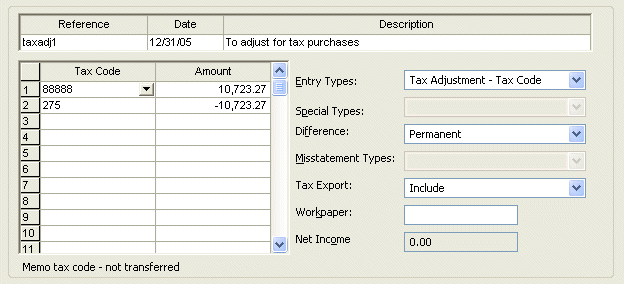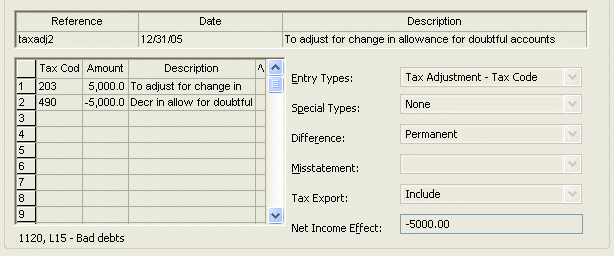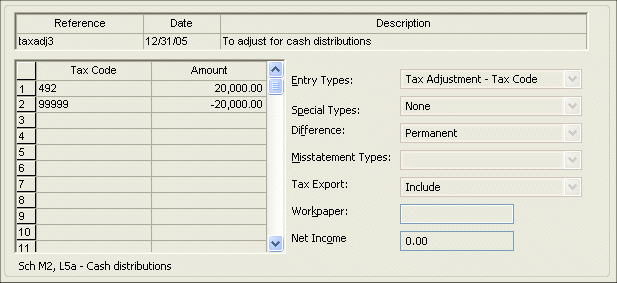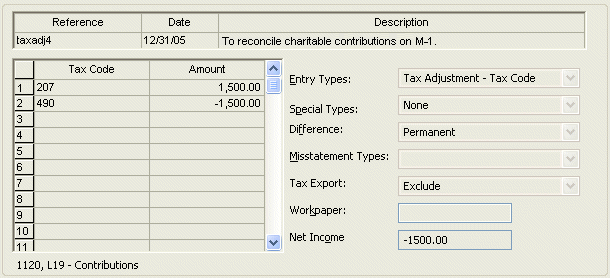Warning
Product support for the Creative Solutions Accounting platform ended on September 30, 2020.
Help & How-To Center content for the Creative Solutions Accounting platform may be outdated and is used at your own risk.
The following examples use entity type 1120 to describe common adjusting journal entries by tax code.
Note: Adjusting journal entries that are posted to tax codes are not included in consolidation for consolidated clients.
See also:Adjusting Journal Entries [Tasks menu]
Example 1
Inventory for the following client decreased by $10,723.27 during the year. To correctly calculate cost of goods sold on the tax return, this amount needs to be adjusted to tax purchases. The memo tax code 88888 is entered in the Adjusting Journal Entries grid to balance the entry of Tax purchases that are decreased by $10,723.27. The amounts that are entered zero out without affecting tax net income.

Example 2
Allowance for doubtful accounts decreased by $5,000.00 during the year. Bad debts deducted on the tax return is increased by $5,000.00 and the Schedule M-1 item for expenses on the return not on the books is increased by $5,000.00.

Example 3
Cash distributions during the year were $20,000.00 in cash. This amount is already included in retained earnings in the chart of accounts. Cash distributions are increased by $20,000 and the balance is posted to the memo tax code 99999. The entered amounts zero out without affecting the tax net income.

Example 4
UltraTax CS calculates specific Schedule M-1 amounts that are not imported from CSA. For example, charitable contributions were increased by $1,500 due to a contribution carryover and a Schedule M-1 item was created for the same amount. An entry is made to reconcile tax net income in CSA to the tax return net income. Tax Export is marked as Exclude for this adjusting journal entry so the entry does not transfer to UltraTax CS.

Creative Solutions Accounting (CSA) calculates the effect on tax net income for adjusting journal entries made to tax codes. Tax codes that do not affect net income are tax codes for Schedules L, M-1, M-2, M-3, and federal tax payments. Additionally, some Schedule K tax codes do not affect tax net income.
CSA treats the following tax codes as income statement tax codes for the following entity types:
| CSA tax codes as income statement tax codes for: | 1120 | 1120S | 1065 |
|---|---|---|---|
| 207 | 1120S, L14a-Book depr-other than COGS | 1065, L16a-Book depreciation | |
| 208 | 1120, L20a-Book depr-other than COGS | 1120S, L15-Page 1 depletion - book | |
| 209 | 1120, L21-Page 1 depletion - book | ||
| 214 | 1120S, L19-Total book amortization | 1065, L20-Book amortization | |
| 215 | 1120, L26-Total book amortization | Sch M1, L4-Start-up > org costs - book | |
| 217 | 1120, L21-Page 1 depln other than oil/gas | ||
| 218 | Sch M1, L5-Org > start-up book expense | Sch M1, L3-Org > start-up book expense | |
| 228 | Sch M1, var-Book section 179 amount | Sch M1, var-Section 179 expense - book | |
| 283 | Sch A, L5-Book depreciation - COGS | Sch A, L5-Book depreciation - COGS | |
| 488 | Sch M1, var-4797 gain/loss - book | ||
| 489 | Sch M1, var-4797 gain/loss - book |
Manually enter five 8s (88888) as the memo tax code to balance the adjusting journal entry to a tax code that affects the tax net income.
Manually enter five 9s (99999) as the memo tax code to balance the adjusting journal entry to a tax code that does not affect the tax net income.
Was this article helpful?
Thank you for the feedback!



